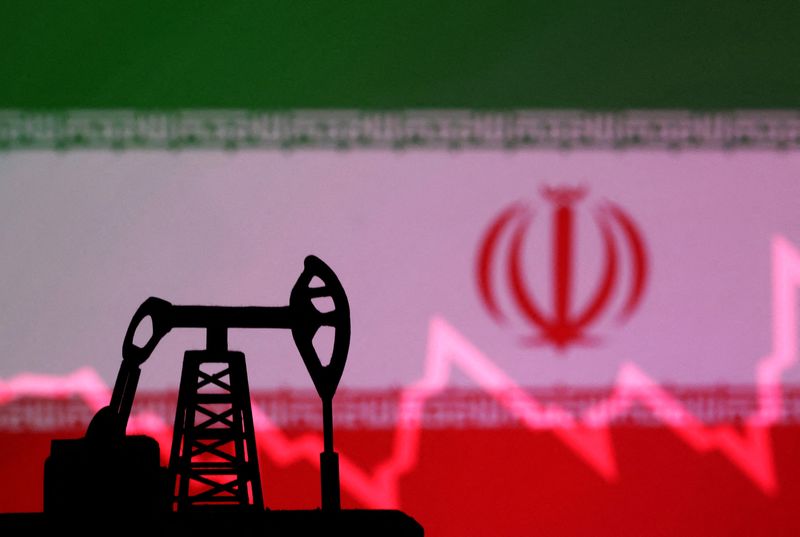By Arshad Mohammed, Timothy Gardner and Michael Martina
WASHINGTON (Reuters) -Iran's unprecedented missile and drone strike on Israel is unlikely to prompt dramatic sanctions action on Iran's oil exports from the Biden administration due to worries about boosting oil prices and angering top buyer China, said analysts.
Shortly after Tehran launched its weekend attack - retaliation for Israel's suspected April 1 strike on the Iranian consulate in Damascus - House Republican leaders accused President Joe Biden of failing to enforce existing measures and said they would take up this week a series of bills to sharpen sanctions on Iran.
Speaking to Fox News on Sunday, Representative Steve Scalise the No. 2 House Republican, said the administration had made it easier for Iran to sell its oil, generating revenues that were being used to "go fund terrorist activity."
The political pressure to punish Iran creates a thorny problem for the administration: how to deter such attacks in future without escalating regional tensions, raising oil prices or antagonizing China, the biggest buyer of Iranian oil.
Washington has said for months that among its primary goals is to keep the Gaza conflict between Palestinian group Hamas and Israel from metastasizing into a wider regional war, with a key aim of keeping Tehran on the sidelines.
The House late on Monday overwhelmingly passed a bill called the Iran-China Energy Sanctions Act, which would expand sanctions on Iran by requiring annual reports to determine whether Chinese financial institutions have participated in transactions on Iranian oil. It would ban U.S. financial institutions from having accounts for any Chinese entities that engage in those deals.
The bill faces an uncertain future in the Senate, which is controlled by Biden's fellow Democrats who are wary of pushing up oil prices.
Several regional analysts said they doubted Biden would take significant action to ramp up enforcement of existing U.S. sanctions to choke off Iran's crude exports, the lifeblood of its economy.
"Even if these bills pass, it's hard to see the Biden administration going into overdrive, to try to spring into action or enforce existing sanctions or new ones to try to cut or curb (Iranian oil exports) in any meaningful way," said Scott Modell, a former CIA officer, now CEO of Rapidan Energy Group.
ENFORCING SANCTIONS
Former President Donald Trump reinstated U.S. sanctions on Iran's oil in 2018 after pulling out of an international deal on Tehran's nuclear program. The Biden administration has sought to crack down on evasion of those measures with sanctions against companies in China, the United Arab Emirates and elsewhere.
Despite those efforts, Rapidan estimates Iran's oil exports have hit 1.6 million to 1.8 million barrels a day, excluding condensates, a very light oil. That is close to the 2 million barrels a day Iran exported before sanctions, said Modell.
The possible effect on gasoline prices is one reason Biden may not move strongly to curb Iran's oil exports.
Kimberly Donovan, a sanctions and anti-money laundering expert at the Atlantic Council, said that oil-related sanctions have not been strictly enforced in the past couple of years.
"I would not expect the administration to tighten enforcement in response to Iran's missile and drone attacks against Israel over the weekend, mainly for concerns (that) could lead to increases in oil prices," she said.
"The price of oil and ultimately the prices of gas at the pump become critical during an election year."
A State Department spokesman said the Biden administration had not lifted any sanctions on Iran and continued to increase pressure on the Islamic Republic.
"Our extensive and overlapping sanctions on Iran remain in place, and we continue to enforce them," said the spokesman.
THE CHINA FACTOR
Aggressively enforcing sanctions could also destabilize the U.S.-China relationship, which Chinese and U.S. officials have tried to repair following a rocky period after the U.S. last year downed a suspected Chinese surveillance balloon that crossed U.S. territory.
Almost all Iranian oil entering China is branded as originating from Malaysia or other Middle Eastern countries and is carried by a "dark fleet" of older tankers that typically switch off their transponders when loading at Iranian ports to avoid detection.
Tanker tracking specialist Vortexa Analytics estimated China acquired a record 55.6 million metric tons or 1.11 million barrels of Iranian crude a day last year. That amounted to roughly 90% of Iran's crude oil exports and 10% of China's oil imports.
Several analysts suggested Washington might take some action to cut Iran's oil exports in part to temper any Israeli reaction to the Iranian strikes, which could escalate the conflict.
But they said this would fall short of dramatic action such as sanctioning a major Chinese financial institution and instead could involve targeting Chinese or other entities engaged in such trade.
"If you really want to go after Iran's oil exports yes, you would have to take meaningful action against China," said one source familiar with the issue.
"Are you really going to go after the big banks? Are you going to do something that the administration has not done and even the Trump administration did not do?" he added.

Jon Alterman, a Middle East analyst at the Center for Strategic and International Studies, said there were limits to what Washington can do to impose sanctions and that evaders are adept at finding loopholes.
"I'd expect to see a gesture in the direction of (imposing) economic consequences on Iran, but I don't expect the White House — or any future White House — to be able to completely turn off the spigot of Iranian oil," he said.